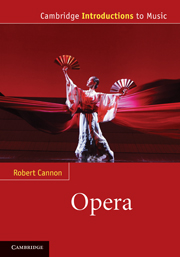Book contents
- Frontmatter
- Contents
- Tables
- Introduction
- Part I The seventeenth and eighteenth centuries
- Chapter 1 Pre-operatic forms
- Chapter 2 First operatic forms
- Chapter 3 Formalisation
- Chapter 4 Reform: the reintegration of elements
- Chapter 5 Comedy and the ‘real world’
- Chapter 6 Authentic performance
- Part II The nineteenth century
- Part III The twentieth and twenty-first centuries
- Appendix 1 Motifs from The Ring used in Chapter 10
- Appendix 2 The development of singing voices in opera
- Appendix 3 The development of lyric theatre alternatives to ‘opera’
- Appendix 4 Some major operas and artistic and political events of the twentieth century, 1899--2008
- Glossary of key terms
- Notes
- Bibliography
- Index
Chapter 1 - Pre-operatic forms
from Part I - The seventeenth and eighteenth centuries
Published online by Cambridge University Press: 05 June 2012
- Frontmatter
- Contents
- Tables
- Introduction
- Part I The seventeenth and eighteenth centuries
- Chapter 1 Pre-operatic forms
- Chapter 2 First operatic forms
- Chapter 3 Formalisation
- Chapter 4 Reform: the reintegration of elements
- Chapter 5 Comedy and the ‘real world’
- Chapter 6 Authentic performance
- Part II The nineteenth century
- Part III The twentieth and twenty-first centuries
- Appendix 1 Motifs from The Ring used in Chapter 10
- Appendix 2 The development of singing voices in opera
- Appendix 3 The development of lyric theatre alternatives to ‘opera’
- Appendix 4 Some major operas and artistic and political events of the twentieth century, 1899--2008
- Glossary of key terms
- Notes
- Bibliography
- Index
Summary
Opera is a dramatic form whose primary language is music. A successful opera must work both musically and dramatically; to understand opera means understanding both elements, and how they interact. This is what makes the study of opera fascinating: it requires us to keep two art forms in balance to create a third. The challenge of opera lies in the potential conflict between these elements, each of which has its own priorities and structures. In some periods it has been dominated by the music – Handel or Rossini, while in others it is the drama that dominates – Gluck or Berg. But the opposition is a false one. It is never a matter of domination, but of the balance that is appropriate to what the composer is trying to achieve and the meaning he or she wants to create.
To define opera as ‘a dramatic form whose primary language is music’ is very broad – as it has to be if it is going to accommodate works as different as Aida, The Mikado and Lulu, let alone have the potential for coping with West Side Story or The Phantom of the Opera. A broad definition is useful, moreover, because it can help to avoid generic traps. Thinking about opera can be restricted by and to those works that were consciously written as and called ‘operas’ or one of the many variants of the word. Wagner used the term ‘music drama’ precisely because he had defined ‘opera’ to his own satisfaction and decided that what he was creating was different: ‘The history of opera, since Rossini, is at bottom nothing else but the history of operatic melody’ (Goldman and Sprinchorn, 1970: 107).
- Type
- Chapter
- Information
- Opera , pp. 7 - 16Publisher: Cambridge University PressPrint publication year: 2012



